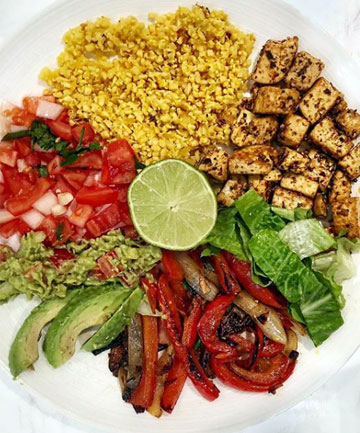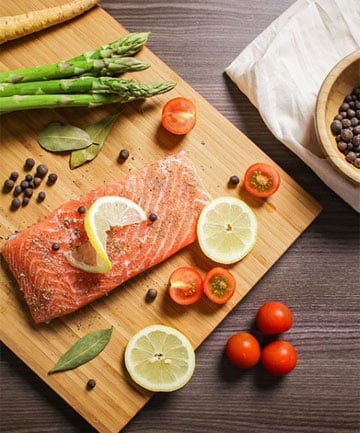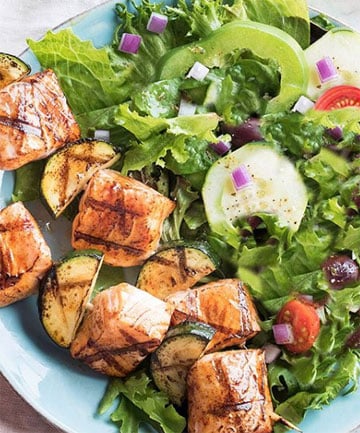The F in F-Factor stands for fiber. "The focus of this diet is to consume large amounts of fiber while still enjoying lean proteins and moderate amounts of healthy fats," explains Morgan. "Alcohol, an occasional sweet treat and dining out are also allowed." Founder Tanya Zuckerbrot's motto is, "Fiber and protein at every meal make losing weight no big deal."
Pros: Morgan is a fan of this diet because of its emphasis on fiber, which favors gut-friendly bacteria and has a positive ripple effect on overall health. "There's a focus on balance and a healthy relationship with food, which is KEY to long-term success. I believe this is a type of eating style that is sustainable over time." Fiber, the non-digestible part of a carbohydrate, decreases appetite by making you feel fuller after eating (it swells in the stomach) making it key for weight loss. Fiber also helps regulate blood sugar, which is why the sugar in fiber-rich berries, for example, will not affect your body the same way that sugar in processed candy bars will.
Con: The only con Morgan sees is that this eating style can be too flexible for someone that has serious health problems or someone with true food addiction that has to draw hard lines with sugar and alcohol. "This is where self-awareness becomes incredibly important to know what type of eating style you will thrive with," Morgan says.
Image via @f_factor
Pros: Morgan is a fan of this diet because of its emphasis on fiber, which favors gut-friendly bacteria and has a positive ripple effect on overall health. "There's a focus on balance and a healthy relationship with food, which is KEY to long-term success. I believe this is a type of eating style that is sustainable over time." Fiber, the non-digestible part of a carbohydrate, decreases appetite by making you feel fuller after eating (it swells in the stomach) making it key for weight loss. Fiber also helps regulate blood sugar, which is why the sugar in fiber-rich berries, for example, will not affect your body the same way that sugar in processed candy bars will.
Con: The only con Morgan sees is that this eating style can be too flexible for someone that has serious health problems or someone with true food addiction that has to draw hard lines with sugar and alcohol. "This is where self-awareness becomes incredibly important to know what type of eating style you will thrive with," Morgan says.
Image via @f_factor
"This diet is heavy on whole grains (about 50%), vegetables (about 25%), beans and seaweed (about 20%) with infrequent consumption of seafood, fruits and nuts," explains Zembroski.
Pros: "The macrobiotic diet emphasizes chewing your food at least 50 times before swallowing to aid digestion and practice mindful eating," Zembroski says. "This is a good thing, as many people eat too fast and chew too little. Chewing your food thoroughly allows you to absorb more nutrients and helps prevent gas and bloating." He also underlines that the macrobiotic diet advocates for the elimination of processed foods and the consumption of organic food and may help regulate abnormal blood-sugar levels as it completely eliminates sugary foods and drinks from one's diet. Silverman adds that it's a "strict and very regimented approach, which is helpful for many people who respond well to structure."
Cons: "The diet relies heavily on grains — 50% of the daily intake — including wheat, which may increase gut permeability (leaky gut) and a whole host of autoimmune diseases," Zembroski says. "Low meat consumption on the macrobiotic diet increases the risk of developing B12 deficiency, pernicious anemia and its multitude of neurological complications." It may also be hard for people to stick with. "This diet takes all the enjoyment out of eating because you're measuring all of your food and you need a lot of time for meal/prep," Silverman says.
Image via @sachimacro
Pros: "The macrobiotic diet emphasizes chewing your food at least 50 times before swallowing to aid digestion and practice mindful eating," Zembroski says. "This is a good thing, as many people eat too fast and chew too little. Chewing your food thoroughly allows you to absorb more nutrients and helps prevent gas and bloating." He also underlines that the macrobiotic diet advocates for the elimination of processed foods and the consumption of organic food and may help regulate abnormal blood-sugar levels as it completely eliminates sugary foods and drinks from one's diet. Silverman adds that it's a "strict and very regimented approach, which is helpful for many people who respond well to structure."
Cons: "The diet relies heavily on grains — 50% of the daily intake — including wheat, which may increase gut permeability (leaky gut) and a whole host of autoimmune diseases," Zembroski says. "Low meat consumption on the macrobiotic diet increases the risk of developing B12 deficiency, pernicious anemia and its multitude of neurological complications." It may also be hard for people to stick with. "This diet takes all the enjoyment out of eating because you're measuring all of your food and you need a lot of time for meal/prep," Silverman says.
Image via @sachimacro
According to Zembroski, the DASH diet was developed to treat high blood pressure without medication. It follows the U.S. guidelines for sodium content. "The DASH eating plan consists of vegetables, fruits, lean meats, whole grains, fish and poultry, nuts and beans."
Pros: "It consistently ranks as top one or two diets by US News and World Report," Davis notes. "It's a sustainable program of eating healthy foods with evidence-based results in lowering blood pressure, cholesterol and weight."
Cons: The only con here is that, like with F-Factor, there isn't as much structure, so it may be hard for some people to stick with if they're not regimented or aren't working with a registered dietitian.
Image via @thedietitianist
Pros: "It consistently ranks as top one or two diets by US News and World Report," Davis notes. "It's a sustainable program of eating healthy foods with evidence-based results in lowering blood pressure, cholesterol and weight."
Cons: The only con here is that, like with F-Factor, there isn't as much structure, so it may be hard for some people to stick with if they're not regimented or aren't working with a registered dietitian.
Image via @thedietitianist
The South Beach Diet is a low-carb, high-protein, low-sugar plan that focuses on the glycemic index — how certain foods elevate blood sugar.
Pros: "As with all diets that promote eliminating simple and refined carbs, including baked goods and sugary soft drinks, a benefit is weight loss," Zembroski says. "It also increases the awareness people have on the effects of adding specific carbohydrates into their diets, allowing the identification of which foods and their quantities create cravings and it helps with sugar cravings based on the plan's different phases."
Cons: "There's no cut-off on calorie intake and without understanding an individual's metabolic rate, overconsuming calories sets the stage for increased body fat," Zembroski says. He also notes that it allows for the consumption of a large dose of dairy, including up to two full cups of milk or yogurt, and all the low-fat cheese needed to satisfy hunger, which can cause inflammation and is linked to chronic health issues.
Image via @southbeachdiet
Pros: "As with all diets that promote eliminating simple and refined carbs, including baked goods and sugary soft drinks, a benefit is weight loss," Zembroski says. "It also increases the awareness people have on the effects of adding specific carbohydrates into their diets, allowing the identification of which foods and their quantities create cravings and it helps with sugar cravings based on the plan's different phases."
Cons: "There's no cut-off on calorie intake and without understanding an individual's metabolic rate, overconsuming calories sets the stage for increased body fat," Zembroski says. He also notes that it allows for the consumption of a large dose of dairy, including up to two full cups of milk or yogurt, and all the low-fat cheese needed to satisfy hunger, which can cause inflammation and is linked to chronic health issues.
Image via @southbeachdiet
This diet eliminates all processed foods, refined sugars, grains, legumes and limits fruit for 30 days. If at any point you eat something you're not supposed to, you have to start the 30-day reset over.
Pros: "It's great to use as an elimination diet and getting yourself to consume foods in their natural state," Davis says.
Cons: "It's restrictive — even just for 30 days — making it hard to eat at a majority of restaurants, so dieters must do a lot of home cooking and prep to be successful," Davis says. "It also eliminates foods like whole grains, legumes and limits fruit."
Image via @whole30
Pros: "It's great to use as an elimination diet and getting yourself to consume foods in their natural state," Davis says.
Cons: "It's restrictive — even just for 30 days — making it hard to eat at a majority of restaurants, so dieters must do a lot of home cooking and prep to be successful," Davis says. "It also eliminates foods like whole grains, legumes and limits fruit."
Image via @whole30








